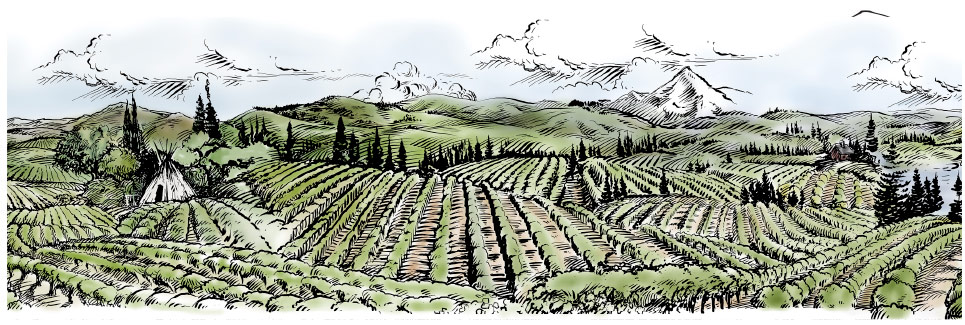Why you may not be very interesting: The current culture of wine
He Said...
- Mike Willison
The wine industry has long suffered the slings and arrows of people both inside and outside that have cried a derisive, "foul!" at the sometimes prolix, garrulous and elaborate vocabulary that is associated with assessing wine. Even in informal settings it seems that haughtiness prevails when talking about, drinking, or recovering from wine. For many, the need to spout hifalutin prose and wild, complex gallimaufry leaves the casual consumer feeling like a sinner at the church picnic. A simple, "I like it because it smells nice," just won’t cut it when the chap next to you in the Savile Row suit is speaking in baroque curlicues that seem to wrap around your head in ornamental rococo poofs.
Watching football the other day I was reminded of something kind of singularly funny about American culture: I know the rules and specific vocabulary of football (e.g. "clipping", or "encroachment") because I have been exposed, from an early age, to the mores of the game. Even having never played the game in an organized league, I can engage in thoughtful and insightful repartee with just about anyone on the subject ("The Tampa 2 defense leaves too many uncovered gaps against a team with an accurate QB that can move in the pocket"- see, not bad). Whether sitting around with Dad while he hurls expletives and cocktail franks at the television or in a lively group, we are immersed in the culture of football, or baseball, or soccer, or scrapbooking, or whatever. The culture of alcohol, on the other hand, is regarded largely taboo and depicted as evil until we turn 21 and miraculously are now responsible enough to handle alcohol so we go around drinking energy drinks dropped in Bavarian Kräuterlikör and making out with that cute girl that sits behind us in Macro-Economics.
We should be allowed to have our fun. I am 100% pro-fun. I stand behind that platform at all times. If your idea of fun in smashing beer cans on your head then I cheer for you and will be there to drive you to the neurologist when your brain is hurting from dents and aluminum shrapnel. However, I also believe that if alcohol and wine in particular was introduced into our culture at an earlier age that we would find much more ease in understanding the complexities and vocabulary of wine. On the other hand I realize that people tend to skew to the lazy side. Football is spoon fed to us by our old friend the television and our Playstations and adults that still paint their faces while wine is seen as "learning" which is code for hard work. Who wants to work all day and then work really hard to breathe deep of the ancient terroir and painstaking winemaking process when the option of sitting on the couch with a handle of XXX is out there?
Look, every single niche has its dungeonmasters. Paper airplane enthusiasts have a forum online. Drinking and enjoying alcoholic beverages is one of them. I like wine. It tastes good. It makes me happy. I also like wine because it teaches me about history, geography, vocabulary, bio-chemistry, food science, and the simple joys of discovery. I choose this path. If you want to become the Lord of Lego Architecture, fine, but don’t get your feathers in a ruffle when I claim that the wine in your glass is pedestrian plonk ripping with TCA. I can’t make a nifty village out of little colored bricks, but I can make something that looks boxy.
She Said...
- Carrie Kalscheuer
From a wine-geek perspective, I agree with you. I've chosen to make this not just my passion, but my career. I can, and do, write long, flowery tasting notes. But standing on the frontlines actively witnessing people read the tasting notes has put much of their bellyaching into perspective.
Wine is frightening to most Americans. As you've stated, European culture is more readily accepting of alcohol in general and the wine culture there is merely an extension of their food culture. But ours is a different animal. Wine has a special place of perceived sophistication in our culture. We can’t necessarily discount this or brush it aside as a puritanical holdover and require that people get on board or stop drinking wine.
The combination of the public's general anxiety and inexperience has allowed many in the field of wine to overstep the boundaries of decorum and slide right into blatant pretention. The wine-snob stereotype follows the same rules as most: there's a reason it became a stereotype.
It is part of our job to make wine approachable. This is the step too-often missed by wine professionals. In the case of the hifalutin tasting note, maybe using speech that isn't so unfamiliar would go a long way in educating those who haven’t chosen wine as their profession. Just as I would expect an architect to explain, in layman's terms, what she plans to build if I’m employing her, so I think we owe it to the people buying our wine to make the process as welcoming as possible. I, for one, am happy that not everyone has decided to become a wine expert. It makes for some powerful job security.

